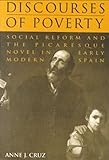Discourses of Poverty : Social Reform and the Picaresque Novel in Early Modern Spain / Anne Cruz.
Material type: TextSeries: University of Toronto Romance SeriesPublisher: Toronto : University of Toronto Press, [1999]Copyright date: ©1999Description: 1 online resource (320 p.)Content type:
TextSeries: University of Toronto Romance SeriesPublisher: Toronto : University of Toronto Press, [1999]Copyright date: ©1999Description: 1 online resource (320 p.)Content type: - 9780802044396
- 9781442673953
- 863/.309355
- PQ6147.P5 C78 1999eb
- online - DeGruyter
| Item type | Current library | Call number | URL | Status | Notes | Barcode | |
|---|---|---|---|---|---|---|---|
 eBook
eBook
|
Biblioteca "Angelicum" Pont. Univ. S.Tommaso d'Aquino Nuvola online | online - DeGruyter (Browse shelf(Opens below)) | Online access | Not for loan (Accesso limitato) | Accesso per gli utenti autorizzati / Access for authorized users | (dgr)9781442673953 |
restricted access online access with authorization star
http://purl.org/coar/access_right/c_16ec
In this ground-breaking study, Anne Cruz examines the treatment of poverty, prostitution, war, and other social concerns in the cultural and literary discourses of early modern Spain. This book investigates the polemics on poor relief through religious charity and secularized reform articulated not only in the Spanish picaresque canon - Lazarillo de Tormes, Guzm¯n de Alfarache, El busc3/4n - but also in female picaresque narratives and soldiers' tales. Emphasizing Bakhtin's notion that discursive practices must be assessed as they intersect and become textualized in history, the book also looks at this literature in relation to normative writings such as royal decrees, regulations, economic proposals, synods, and sermons. Through these discourses, authors and authorities alike debated their theories of poor assistance for both men and women, from the critique of unregulated prostitution in works such as La lozana andaluza to the control of impoverished youths through military conscription as in Alonso de Contreras and Estebanillo Gonz¯lez. The rupture of the feudal system and the economic devastation of the country precipitated a dramatic rise in the number of poor, who were increasingly perceived as delinquents by an anxious populace. The book employs Foucault's paradigms of confinement and control to study the various suggestions for the social containment of Spain's marginalized elements. Positing that the literary p¦caros and p¦caras assume the role of scapegoats for this disenfranchised social Other, Cruz further argues that the picaresque novels respond dialectically to the growing demonization of the poor in early modern Spanish culture.
Mode of access: Internet via World Wide Web.
In English.
Description based on online resource; title from PDF title page (publisher's Web site, viewed 01. Nov 2023)


